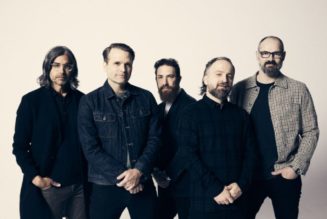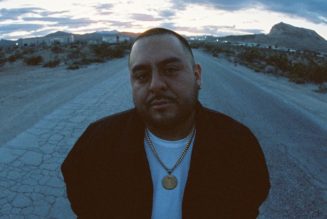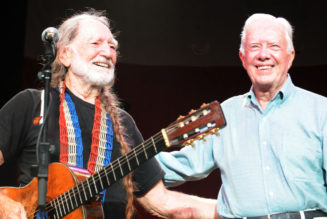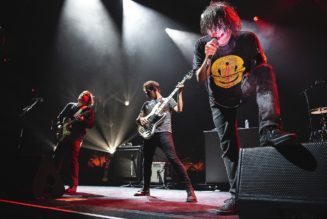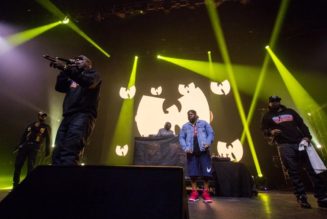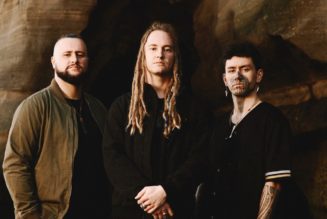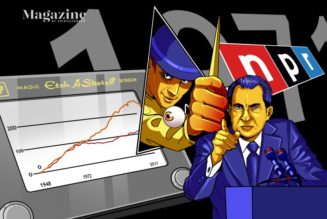Before he was the Grammy-winning musical chameleon he is today, James Blake found himself in a constant state of emotional camouflage.
Like any prodigious musician on the come-up, the pressure to be “cool” hovered like a black cloud, following him from party to party. And his moods changed like quicksilver, leading to a bit of an identity crisis, says Blake, whose titular track from his scintillating Before EP was recently nominated for a Grammy Award in the category of Best Dance/Electronic Recording.
“I’ve always felt slightly on the outside of things. In any scene I was ever in, I was always on the outside looking in,” Blake tells EDM.com. “And I think it took me a long time to realize that there was no scene, you know? There was no being outside looking in—it was only that I hadn’t acknowledged that actually, I was something.”
While it rumbles with rave sensibilities, the crux of Before is Blake’s elusive search for a sense of self. After years of writing about loneliness and detachment, each of the record’s four quaking tracks are aftershocks of a chasm between artistic dualities: the vulnerable and the carefree.
“That’s often the misconception that outsiders have when they feel like outsiders, or maybe even the lie that we’re told is that we need to fit into something,” continued Blake, who says he was bullied when he was young. “And there’s a lot of FOMO around not being one of the cool kids. It’s funny because as much as my career has seemed—pretty much since the beginning—probably like I’d succeeded in becoming cool, I never felt it. It was more of an avatar. The actual person didn’t really particularly resonate. The only thing I resonate with is my music, and the people who listen to it.”
But to the prolific Blake, if his alienation was wrong, it’s tough to imagine being right.
“I have a lot to thank,” he said. “Did it need to be as bad? Maybe not. But who knows? Would I have been as musical?”
A departure from his lovelorn ballads of yesteryear, “Before” is an unapologetic return to Blake’s DIY electronic music bedrock. His ability to transfix listeners into rabbit holes of languid sonic boom is as strong as ever in its breathtaking namesake EP, which harkens back to his early dubstep and electro-soul influences.
Blake likens electronic music production to an “infinity mirror,” a microcosm of his deeply experimental approach to Before.
“You can just go on forever,” Blake says with a smile. “If you want to, you can experiment for literal ever until a sound is beyond recognition and you are just dabbling in the unknown.”
EDM.com: Since “Before” is a bit of a divergence from your more recent work, did you find yourself going through a sort of identity crisis? Or did you find it easy to tap into your electronic roots?
James Blake: I’ve probably been having this, I don’t know, low-level identity crisis my whole life really when it comes to this kind of thing. Music being split between all these different things that I like to do. Always there’s going to be an audience for that, and what about, “If I try this, are people really going to want to come and listen? Is it going to make sense that it’s going to come under the same name?”
Even when I first came out, I was doing dance music and electronic music and these kind of weird, collage-y, ambient things as well. To then go from that to sing “Limit to Your Love” and my first record and stuff like that, people had a taste pretty quickly of the duality. And I think initially, to people at the time, it probably seemed like I was actually just going mainstream or, you know, changing too quickly. But I think as my career went on people started to realize, “Oh, there’s a pattern here.” I loved playing with expectations and reminding people that that wasn’t the only time that I was going to do the polar opposite of the last thing.
And then in the last few years, in the years before Before, some people were asking me, “Are you going to do electronic music again?” Because it had been so many years—I think it’d been like five years at that point. And strangely and ironically, during the quarantine when no clubs were open was the time that I felt like the most like making dance music. I don’t know why.
EDM.com: Well there was nowhere to dance. Literally.
James Blake: That was it. Just things I was listening to at the time, and I just got into this headspace of wanting to finish something like that. And except this time it kind of took on some of the songwriting elements too, that I’d been kind of honing over the years.
EDM.com: Striking that dichotomy between ballad and banger is one of the most elusive achievements for electronic music producers. Was that polarity top of mind during the recording process?
James Blake: No, actually. “As” and “Wish” by Stevie Wonder have always struck me. Or “The Love I Lost” by Harold Melvin & the Blue Notes. Songs like that, where there’s this beautiful and bittersweet song accompanied by house music or disco, was just something that I’ve always loved.
I play those songs when I DJ and I think Before is kind of my version of that, you know, but not quite as amazing (laughs). I’m not comparing them, but in my mind, that’s how I filter them through my kaleidoscope.
EDM.com: The mythos of this record lies in its vulnerability, especially in “I Keep Calling.” What message does it send about our tendency as humans to stifle our own emotional clarity?
James Blake: I’d say [Before] wears its heart on its sleeve. “Summer of Now” is probably the most cryptic, but even then, you know, it’s got some wistful, romantic musings. And I think you can get the sense of what it’s about even if you’re not completely tuned in lyrically.
I think if anything I was expressing my thoughts. It doesn’t seem repressed to me, this record. Dance music has a way of making things become hypnotic in the right setting, and I think that’s the true power of it, is allowing you to explore your feelings subconsciously while you’re doing something else.
There’s a duality to a lot of these things. Dance music has that. I think it’s deeply meditative.
EDM.com: It’s cathartic in a way, isn’t it? I don’t want to say it could lead to “out of body” experiences or anything like that, but when you’re dancing and raving and what not, it really can be that way.
James Blake: Yeah. I’ve been to so many different types of parties, where it’s like you’ve got places where it feels like you’re really tuned into the music. Places where it just feels like you’re partying. And the places where it feels like you’re kind of meditating in a weird way. And they’re all good. Each type is fun.
EDM.com: And speaking of vulnerability, I want to talk about Friends That Break Your Heart. I think it’s the strongest songwriting effort of your career. Was there a creative epiphany or breakthrough somewhere along the line?
James Blake: I think “Say What You Will” was the breakthrough. There were a few others. “I’m So Blessed You’re Mine” was a moment where I really just felt like I’d done something completely new, which was cool. “Say What You Will” really ticks the traditional singer-songwriter box for me in a way that I really wanted to tick. And once I ticked that, I was kind of done really. I was like, “Well, I’ve written the song I need to write for my career” (laughs).
It’s like I felt I was leading up to doing that for a long time. It was a song I really wanted to write that was somewhere in my subconscious and I couldn’t quite grab it. And then I wrote that and I thought, “There it is. That’s the one. I don’t need to strive to do that anymore because I’ve done it.”
Recommended Articles
EDM.com: How did you conjure that?
James Blake: I don’t know. They come to you like a sort of lucid dream. You don’t know why you dream about certain things, right? It’s like we just wake up and we’re like, “Huh, that was weird.” After writing the song, I basically did that. I knew why emotionally—emotionally I could see why that came out of me at the time—I felt all those things and I wanted to talk about that.
But at the same time, Neal Brennan, who was the inspiration for the song, showed me his new standup special that he’s now performing in New York at the moment. I read it and had a lot of shit come up. I really just didn’t expect it. It was funny—really funny—but I also didn’t expect to be so moved. And it compelled me to write “So What You Will.”
EDM.com: There’s an overt mention of being a black sheep in “If I’m Insecure.” How does the idea of alienation influence your songwriting?
James Blake: I think when you’re at school, they’ll find any reason [to bully] really. It’s kind of indiscriminate in a way. The discrimination is indiscriminate.
I wore my heart on my sleeve. I was an easy target. I was a bit weird and I think I just didn’t really fit in. I remember when I was younger I had some Tourette’s-type ticks and sorts of stuff that probably wasn’t helping. Things that I later somehow grew out of. But there were so many ways to pick on me back then (laughs).
There are loads of ways in which I was lucky as well. Very often you develop empathy by going through something yourself. And then ultimately you work out that it’s not really worth it to judge people based on whatever it is.
I’ve definitely come a long way in terms of going, “You know what, I’m tired of trying to fit in.” I know a lot of people would listen to that and go, “It doesn’t look like you ever did try to fit in,” but you’d be surprised.
EDM.com: I think because you went through all that, people hear this album and realize there’s a lot of shared experiences in there. It’s intrinsically empathetic. I see how people who considers themselves black sheep could really resonate.
James Blake: Yeah. It’s also how you relate to you family too, you know? When I was younger, being an only child—in lots of ways it’s great and then in other ways you can feel quite alienated because obviously the only people you’re talking to on a daily basis are quite different than you and a lot older.
If I’m an only child, how do I feel like the black sheep? It was part of an entire ecosystem of feeling that way. I love the idea of having more than one outlet to go and talk to about a problem.
EDM.com: Back to the album. The lockdown was lonely for many, but it was also an ideal time to analyze our friendships. Why is it so hard to move on from friends who failed to give you what you needed? Or is it easy?
James Blake: It’s easier and easier to not feel connected and empathetic, isn’t it, to people’s mind states. Not to be conspiratorial, but it helps keep us divided. The more isolated we are, the less effective we are as people, as members of society and community. And community is communication. The way forward has to be less tech, more chat.
EDM.com: Couldn’t agree more. We’d be so much better off without social media.
James Blake: The funny thing is—and you’ll resonate with this—my career would obviously not be the same. Maybe I wouldn’t be here talking to you if it hadn’t been for technology and the internet.
When I was coming up, a lot of people were making quite a big deal out of the fact that I was doing everything with a laptop. I was DIY music essentially. No engineer or big studio or that kind of stuff. But that actually affected me quite badly—having my entire career conducted from this computer. Staring at that screen all day takes away your… I felt very robot-like at the end of a session.
People would come into the studio in my house and be like, “Hey do you want some dinner? We’re all going to eat together.” And it was strange—I couldn’t empathize. Because I’d just been staring at this fucking computer screen for six hours or whatever. And maybe not getting anywhere.
And it really interfered with my ability to socialize. If anything, when kids or anyone asks me now, what they should use to make music with, I say just go DAW-less. Try something else (laughs). Don’t do what I did.
EDM.com: It’s tough to get yourself out of that zone, isn’t it?
James Blake: I just felt like a stock trader or something. It’s a part of the brain that like, in music, is actually antithetical to emotional expression.
When I’m playing piano and having a great time or singing with friends, that’s one side of it. And the other side of it is just sitting here staring at a screen. For way more hours. Because I’m basically editing a movie, constantly. And it’s not really good for me, so I actually try and stay away from the computer as much as I can.
EDM.com: It’s the tedious work like that that really affects your mental health.
James Blake: I’m trying to get closer to the actual expression of it. That’s what I’ve been trying to do for years, even though I know I’m known for doing this kind of cyborg mishmash of things. I have to balance it quite carefully, because otherwise I can go right down the rabbit hole and it’s not good for me.
EDM.com: Yeah, it can get very experimental at times. But how far do you go before you realize it’s affecting you?
James Blake: You can just go on forever. If you want to, you can experiment for literal ever until a sound is beyond recognition and you are just dabbling in the unknown. And that’s really fun, but also sometimes, to get there, it’s like we’ve got to dedicate our bodies to this sort of computer overlord.
If a track feels good, than it just doesn’t matter what your theory was behind it. And I think that’s the beauty of dance music, is that it’s about experimentation and about making something feel potent. If it has a potency, it kind of almost doesn’t matter where that potency comes from. There’s a lot of dance music from all types that are just done with absolutely no musical theory knowledge whatsoever, and it’s probably some of the best ever made.
EDM.com: That’s the beauty of it, isn’t it? There’s no “right” answer.
It’s a little like having a chat about the existence of God. We could posit many theories about what makes good dance music or good music in general, but ultimately it’s a feeling, isn’t it? You can’t download your experience into others or theirs into you.
Editor’s Note: This interview was lightly edited and condensed for clarity.





